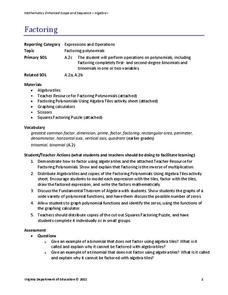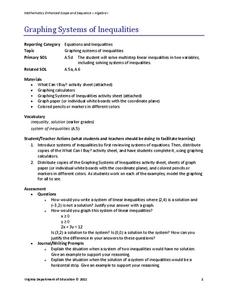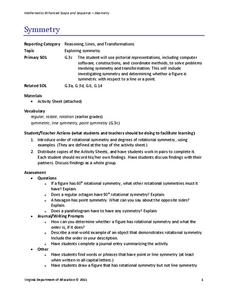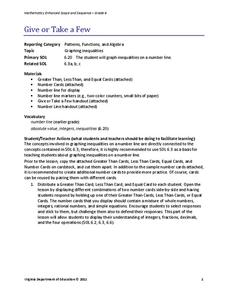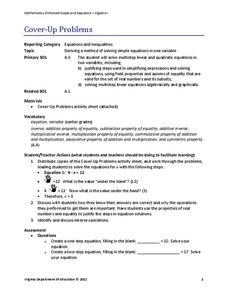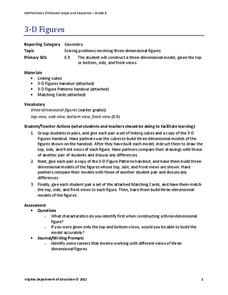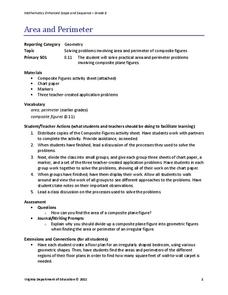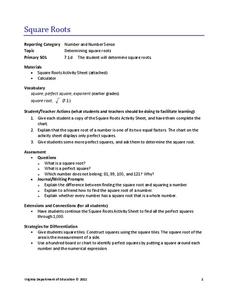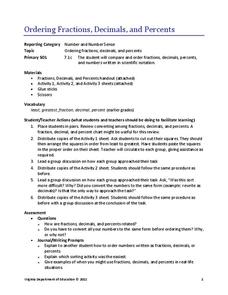Virginia Department of Education
Graphing Linear Equations
Combine linear equations and a little creativity to produce a work of art. Math scholars create a design as they graph a list of linear equations. Their project results in a stained glass window pattern that they color.
Virginia Department of Education
Inductive and Deductive Reasoning
Introduce pupils to the two types of reasoning, inductive and deductive. Classmates work in pairs or small groups to learn the difference between the two and apply these reasonings to develop valid conclusions.
Virginia Department of Education
Angles in Polygons
Polygons — it's all about the angles. Groups work with dynamic geometry software to find the sum of the measures of the angles of various polygons. After finding the information for several polygons, the groups generate a formula that...
Virginia Department of Education
Evaluating and Simplifying Expressions
Discover how algebra tiles help evaluate expressions. Scholars learn to use algebra tiles to substitute values in for variables and evaluate expressions. The included worksheet contains a set of evaluation problems to assess individuals'...
02 x 02 Worksheets
Factoring
Factor in this resource when teaching how to factor polynomials. Scholars use algebra tiles to factor linear and quadratic expressions. They practice their skill by working on example problems from a worksheet.
Virginia Department of Education
Graphing Systems of Inequalities
Apply systems of inequalities to a real-world problem. Here, scholars learn to graph solutions to systems of linear inequalities. To finish the lesson, they solve a problem involving burgers and cheeseburgers using a system of inequalities.
02 x 02 Worksheets
Symmetry
Get learners' minds rotating and reflecting while looking for symmetry. Pupils investigate figures to determine the number of lines of symmetry and if the figure has rotational symmetry. Classmates work together in groups to find out the...
Virginia Department of Education
Quadrilateral Sort
If only you had a Sorting Hat to sort out quadrilaterals. Learners sort cutouts of quadrilaterals based on their properties and attributes. A flowchart helps them organize the results of the activity.
Virginia Department of Education
Surface Area and Volume of a Cylinder
Surface area or volume? Pupils first review the difference between surface area and volume. They then use a two-dimensional net that helps them develop formulas for the surface area and volume of cylinders.
Virginia Department of Education
Volume of a Rectangular Prism
Fill the minds of your young mathematicians. A hands-on activity has learners fill in a rectangular prism with unit cubes to determine its volume. the exercise provides a great hands-on way for learners to connect the activity to the...
Virginia Department of Education
Similar Figures
How similar do figures have to be to be similar figures? Individuals learn to identify similar figures by verifying that angles are congruent and sides are proportional. Additionally, they match the corresponding parts of similar figures.
Virginia Department of Education
Give or Take a Few
Young mathematicians extend their knowledge of rational numbers on a number line to graph inequalities by first using number cards to compare rational numbers. They finish by using similar reasoning to graph inequalities on a number line.
Virginia Department of Education
Exponents
Expand your knowledge of exponents with an activity that promotes critical thinking and comparison skills. Middle and high schoolers compare numbers written in expanded and exponential form and explain their strategies for solving...
Virginia Department of Education
Complex Numbers
Build on your class' understanding of real numbers as they begin working with complex numbers. Pupils begin with an exploration of i and the patterns in the powers of i. After developing a definition for i, they simplify complex number...
Virginia Department of Education
Analyzing and Interpreting Statistics
Use measures of variance to compare and analyze data sets. Pupils match histograms of data sets to their respective statistical measures. They then use calculated statistics to further analyze groups of data and use the results to make...
Virginia Department of Education
Cover Up Problems
Don't cover up this resource — use it out in the open! Pupils learn how to cover up various parts of a linear equation in order to help solve the equation. A worksheet of problems provides practice with this skill.
Virginia Department of Education
3-D Figures
Scholars construct three-dimensional figures to study dimension and side views. Learners build models using linking cubes to match views of different sides. After practicing with models, they attempt to match three-dimensional drawings...
Virginia Department of Education
Area and Perimeter
Develop a strategy for finding the area and perimeter of irregular figures. Building on an understanding of finding area and perimeter of rectangles and triangles, learners apply the same concepts to composite figures. After practicing...
Virginia Department of Education
Sales Tax and Tip
Don't forget to tip your server. Future consumers learn how to calculate sales taxes and tips. Pairs use actual restaurant menus to create an order and determine the total bill, including taxes and tips.
Alabama Learning Exchange
Is My Water Safe?
Learners discuss what makes their drinking water safe and unsafe. They locate and visit a local tributary and test the water's pH, hardness, dissolved oxygen, and total alkalinity. They compose a summary paragraph about the tests and...
Virginia Department of Education
Factoring for Zeros
Relate factors to zeros and x-intercepts. Scholars first graph quadratics in both standard and factored forms to see that they are the same. They go on to use the graphs to see the relationship between factors and x-intercepts.
Virginia Department of Education
Scientifically Speaking
Explore the connection between operations with scientific notation and the laws of exponents. Scholars work on a set of word problems involving operations with scientific notation. Along the way, they consider how the laws of exponents...
Virginia Department of Education
Square Roots
Square away any doubts about using a new resource. Pupils learn about squares and square roots in the mini-instructional activity. They complete a worksheet identifying roots of perfect squares up to 400.
Virginia Department of Education
Ordering Fractions, Decimals, and Percents
Order up a resource on comparing rational numbers. Scholars order fractions, decimals, and percents by converting to a single form. They conduct a cut-and-paste activity ordering three sets of rational numbers.






